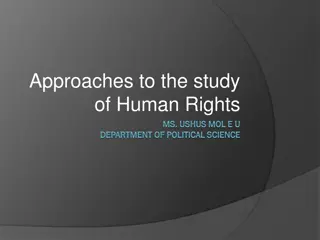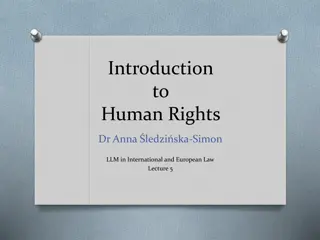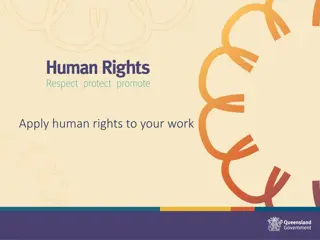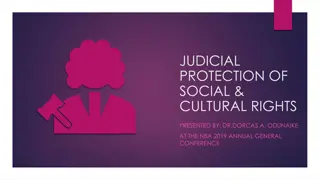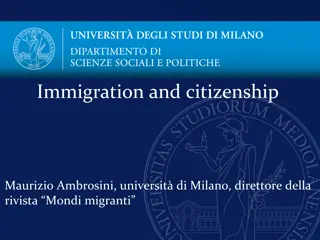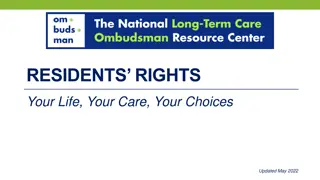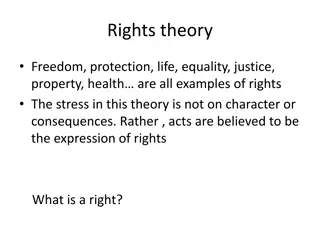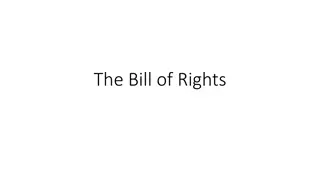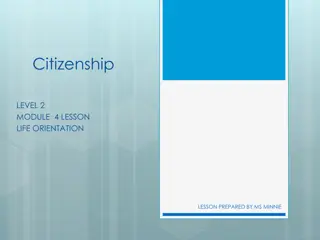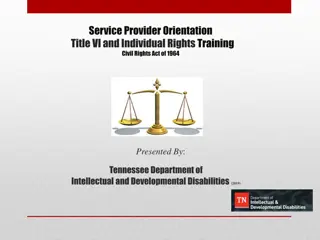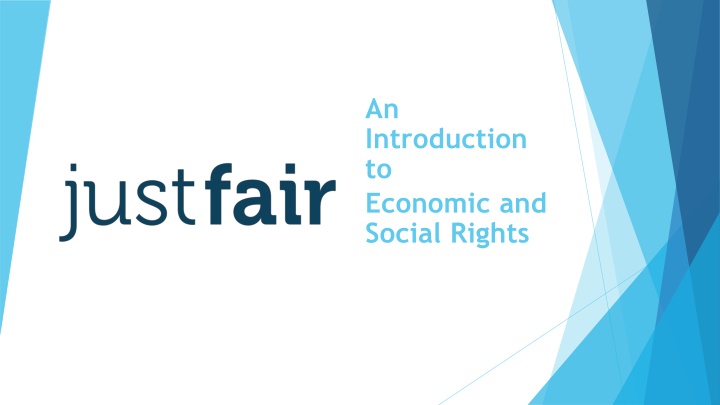
Introduction to Economic and Social Rights
In this overview, we delve into the International Covenant on Economic, Social, and Cultural Rights, monitoring bodies like the UN Committee on Economic, Social, and Cultural Rights, and key provisions such as self-determination, right to work, social security, and more.
Download Presentation

Please find below an Image/Link to download the presentation.
The content on the website is provided AS IS for your information and personal use only. It may not be sold, licensed, or shared on other websites without obtaining consent from the author. If you encounter any issues during the download, it is possible that the publisher has removed the file from their server.
You are allowed to download the files provided on this website for personal or commercial use, subject to the condition that they are used lawfully. All files are the property of their respective owners.
The content on the website is provided AS IS for your information and personal use only. It may not be sold, licensed, or shared on other websites without obtaining consent from the author.
E N D
Presentation Transcript
An Introduction to Economic and Social Rights
What will we cover? Introduction to the rights and UN Covenant on Economic, Social and Cultural Rights Treaty monitoring, the UN Committees on Economic, Social and Cultural Rights and the 7th Periodic Review Domestic incorporation and momentum in the UK Myth busting Closing thoughts Q&A
International Covenant on Economic, Social and Cultural Rights International human rights law Essential conditions needed to live a life of dignity and freedom Ratified by the State of Great Britain and Northern Ireland in 1976 Legally binding in Great Britain and Northern Ireland Economic Social and Cultural Rights (ESCR) or Economic and Social Rights (ESR) Equal status in international law with civil and political rights, such as freedom of expression or the right to a fair trial Regional law (ECHR) and domestic law (HRA)
UN Committee on Economic, Social and Cultural Rights (CESCR) International human rights treaties have independent expert bodies to monitor and help states implement human rights at the national level. For the International Covenant on Economic, Social and Cultural Rights (ICESCR) the monitoring body is the UN Committee on Economic, Social and Cultural Rights (CESCR). UN body of 18 independent experts that monitors the implementation of the ICESCR at the national level. Three main functions 1. General comments authoritative statements about the meaning of the different rights well developed international jurisprudence 2. Review state compliance periodically and issue concluding observations 3. Complaints/ communications to the CESCR The Optional Protocol
Rights Article 1 self-determination (political representative from the group claiming the right) Article 2(1) progressively realise the rights using maximum available resources Article 2(2) non-discrimination in access to rights Article 3 equal right of men and women to enjoy rights -- Article 6 right to work Article 7 just and favourable conditions of work Article 8 unions Article 9 social security Article 10 family assistance, protection of mothers (maternity leave) Article 11 adequate standard of living (including food, clothing and housing) Article 12 mental and physical Health (incl. epidemics) Article 13 & 14 education Article 15 cultural rights
RIGHTS and DUTY BEARERS All human beings in Great Britain and Northern Ireland regardless of legal status and documentation
DUTY-BEARERS Cental and local Government, and relevant public bodies, are under a legally binding duty to respect, protect, and fulfil the rights contained in ICESCR. This means that public bodies are: In respect of each there are minimum core obligations and then margins of appreciation RESPECT: prohibited from direct or indirect interference with rights PROTECT: obliged to prevent third party interference with rights FULFIL: obliged to adopt necessary measures to ensure everyone enjoys rights Article 2 contains non-discrimination provision and duty to use maximum available resources (e.g. tax evasion) to progressively realise - principle of non- retrogression (e.g. austerity)
Example: General Comment 19: the Right to Social Security 22. Benefits, whether in cash or in kind, must be adequate in amount and duration in order that everyone may realize his or her rights to family protection and assistance, an adequate standard of living and adequate access to health care, as contained in articles 10, 11 and 12 of the Covenant. States parties must also pay full respect to the principle of human dignity contained in the preamble of the Covenant, and the principle of non- discrimination, so as to avoid any adverse effect on the levels of benefits and the form in which they are provided. Methods applied should ensure the adequacy of benefits. The adequacy criteria should be monitored regularly to ensure that beneficiaries are able to afford the goods and services they require to realize their Covenant rights. Would sanctions regime past this test? The benefit cap?
Example: general comment 4: the rights to adequate housing The right to housing should not be interpreted in a narrow or restrictive sense which equates it with, for example, the shelter provided by merely having a roof over one s head or views shelter exclusively as a commodity. Rather it should be seen as the right to live somewhere in security, peace and dignity Number of normative requirements: Security of tenure; availability of services; affordability; accessibility; cultural adequacy Obligation on state parties to take measures necessary to ensure the right is fulfilled using the maximum available resources may involve interfering with the market but maybe through social housing rather than right to buy, or maybe no fault evictions would have to be banned? But the right is not absolute: Complaint no: 048/2018 no violation See Grootboom (SA) and Olga Tellis (India) decisions
UN Treaty Review Cycle Parallel Report State Party Submits Report Submission to LoIs List of Issues developed Follow-up Recommendations/ State Reports issued Attending PSWG Shadow Follow-up report Comments to the Concluding Observations/Recommendations Response to List of Issues Updated Parallel Report Concluding Observations/ Recommendations Issued Consideration of State Party Report (ie the 'Review') Attending the Review
Why get involved in a treaty review? Evidence based process where actions and inactions of State reviewed on international stage and held to account Huge moral force Strengthen lobbying and advocacy in line with international standards Empower communities
The 6th Periodic Review of UK 2016 Concluding observations No legislation dealing with human rights responsibilities of businesses Tax policy: increases to inheritance tax threshold and lack of any action on tax evasion and off shore tax havens Committee was seriously concerned about the disproportionate, adverse impact that austerity measures introduced in 2010 are having on the enjoyment of economic, social and cultural rights by disadvantaged and marginalized individuals and groups and deeply concerned about the various changes in the entitlements to, and cuts in, social benefits Low rates of asylum support and restrictions on working High rates of self-employment and zero hour contracts Minimum wage (or living wage ) insufficient to provide for an adequate standard of living persistent critical situation in terms of the availability, affordability and accessibility of adequate housing lack of social housing has forced households to move into the private rental sector, which is not adequate in terms of affordability, habitability, accessibility and security of tenure.
The 6th Periodic Review of UK 2016 recommendations Committee made a raft of recommendations 73 in total make all necessary steps to reduce higher education fees amend the legislation on termination of pregnancy in Northern Ireland to make it compatible with other fundamental rights all necessary measures to ensure adequate care and treatment of older people introduce higher taxes on junk foods and sugary drinks and consider adopting strict regulations on the marketing of such products, while ensuring improved access to healthy diets. a comprehensive national strategy for the protection and promotion of the right to adequate food
International Examples Many countries explicitly recognise ESC rights in their constitution, e.g South Africa, Portugal, Argentina and Finland. Many others have ESC rights as something less than fully justiciable eg Ireland, India, Germany and Sweden. In other countries like Canada they use equality provisions to advance positive rights. Other countries are actively considering incorporation including Scotland, Chile and New Zealand.
Domestic Application Scotland and Wales, have both made strides to incorporate international standards into domestic decision making and laws. The Rights of Children and Young Persons (Wales) Measure 2011 Part 1 of the Children and Young People (Scotland) Act 2014 The UNCRC (Incorporation) (Scotland) Bill 2021
The UNCRC (Incorporation) (Scotland) Bill 2021 Key features: Public authorities must not act in a way that is incompatible with the UNCRC requirements Courts will have powers to decide if legislation is compatible with the UNCRC requirements Scottish Government can change laws to make sure they are compatible with the UNCRC requirements The Children and Young People s Commissioner Scotland and Scottish Human Rights Commission will have powers to take legal action to protect children's rights Scottish Government must publish a Children s Rights Scheme to show how it is meeting UNCRC requirements and explain their future plans to progress children s rights Scottish Government must review how the Children's Rights Scheme is working each year Other authorities listed in the Bill must report every three years on what they are doing to meet the UNCRC requirements
Myth busting.. AS momentum grows and ESR jurisprudence evolves and develops there remain many sceptics ESR are non-justiciable, cannot legitimately be enforced by a court as contravene parliamentary supremacy and are aspirational in nature. But, clearly justiciable (see S.A), not so different from C&P rights (qualified and involves resources) creates normative framework that parliament/executive has primary responsibility to devise and implement: use of courts is last resort. don t prescribe a particular political system (state control v. laissez faire for example) but insist on evidence based policy measurable outcomes an minimum standards.
CLOSING THOUGHTS Economic and social rights are human rights recognised in international law. Its time that they were recognised in our domestic law. Meantime The UK must comply with its international human rights obligations as a matter of international law e.g Covid-19 vaccines to low/middle income countries. The government must implement the recommendations of the UN Committee on Economic, Social and Cultural Rights and other human rights institutions. Just Fair is currently planning its input to the 7th periodic review of the UK by CESCR likely to happen in 2023

